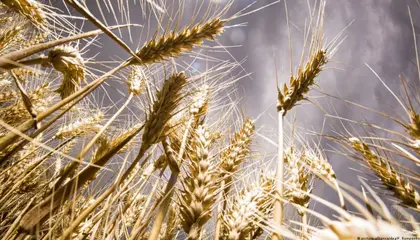Despite the war, Ukraine is looking for various ways to export grain to African countries, which are its main buyers. But Russia continues to create obstacles to the export of grain by sea -blocking ships in the Black Sea. The EU’s chief of Common Foreign and Security Policy (CFSP) , Josep Borrell, announced on April 17 that 50 ships has been blocked in the Bosphorus Strait.
Meanwhile, problems have begun in the European Union. A number of countries - Poland, Hungary, Slovakia, Bulgaria, and Romania - began banning the import of Ukrainian agricultural products, due to the demands of local farmers. They believe Ukrainian products are displacing theirs on roads, railways, ports and domestic markets. In addition, it seems that Ukrainian grain has collapsed in value on the market, causing European farmer profit losses.
JOIN US ON TELEGRAM
Follow our coverage of the war on the @Kyivpost_official.
Notably, Eastern Europe nations have alternate ways of supplying grain to Africa and Asia through local ports. So, while the quantity of Ukrainian grain in the European market has increased, the increase has only partially affected the overall market.
After all, the larger profits of European farmers became possible only because of Russia invading all of Ukraine and blocking the export of agricultural products. With the establishment of new grain export routes, the situation stabilized, and prices decreased.

French Foreign Minister in Kyiv on Solidarity Tour
But European farmers didn’t like it.
For example, on April 19, Acting Prime Minister of Bulgaria Galab Doneva said:
“The main reason is that over the last year, contrary to the idea of the so-called corridors of solidarity, significant amounts of food remained in the country and disrupted the main production and trade chains. If this trend continues and even increases, which is quite realistic after the introduction of similar bans by other countries, it is possible to achieve extremely serious consequences for Bulgarian business.”
Olga Trofimtseva, Ambassador-at-Large of the Ministry of Foreign Affairs of Ukraine, says that this problem arose at the end of 2022. One of the reasons is logistics, which cannot be solved in a short time.
“The transport system of the European Union was not ready for the volume of grain and agricultural products that began to arrive from Ukraine,” said Trofimtseva in a comment to Kyiv Post. “And even then, there were first farmers in Romania and Poland who said that certain steps should be taken to build transport routes. But unfortunately, it didn’t happen quickly. And this is one of the most important factors that led to what we have now.”
She doesn’t see an organized campaign against Ukrainian grain. Regarding Poland, Trofimtseva sees some political interests - because parliamentary elections are scheduled there this fall.
Meanwhile, the European Commission didn’t support the radical actions of the governments of Eastern Europe. They stated that such trade policy belongs to the exclusive purview of the EU and unilateral actions are unacceptable.
In addition, an additional support package for affected European farmers in the amount of $109 million is being set up for their relief.
“We are currently working on the second package of measures, within the framework of which we will continue to support these countries that have been affected by the supply of grain from Ukraine," said a representative of the European Commission, Euractiv reports.
The first aid package in the amount of $61 million was provided to Poland, Bulgaria and Romania at the end of March. But this was not enough. Therefore, the European Commission hopes that the new aid package will resolve the situation.
Pavlo Kukhta, a Ukrainian economist, doesn’t blame either European or Ukrainian farmers for the current situation. “Russia is to blame for everything. Russia created such conditions when the normal functioning of the economy, which had been working for decades, was destroyed,” he told Kyiv Post.
So, we can understand the plight of EU farmers. Because for them, agribusiness is a matter of survival. If they can’t sell their grain, they are going to demand their problem be resolved.
“If logistics is complicated, accordingly, thousands of manufacturers in Ukraine, Poland, and other places are trying to sell goods,” said Kukhta. “Large batches of grain are not exported to the markets either in Poland or in other European countries, they go further [Africa, Asia]. But it is clear that in such a difficult logistical situation, one of the Ukrainian producers will sell grain to Poland as well. This is business. Whoever can, sells there. Farmers do their business as best they can.”
The Chamber of Commerce and Industry of Ukraine also does not see a big problem. The first vice-president of the chamber, Mykhailo Nepran, said in a comment to the Ukrainian media “Suspilne” that when Ukraine signed an agreement with the EU on a free trade zone in 2022, “we agreed on the export of Ukrainian goods to the European community, including agricultural goods.”
“As a result, when it was given to us [Ukraine], someone lost it. It just doesn't work like that,” he said. “So the situation turned out to be that instead of transiting the grain through these countries [of Eastern Europe], it was going on to other countries. There were Ukrainian and Polish dealers who agreed: ‘Why should we deliver to the Baltic ports, let's buy from you here, give a discount.’”
As a result, Ukrainian grain began to be sold to Poland at a discount — $30 to 50 cheaper than Polish grain, expert says.
“Most likely, Ukraine will come to an agreement, but there will be strict control over transit and ports,” said Nepran. “In this situation, imports will be stopped. Now they are giving the numbers: last year — 30 tons of grain in Poland, ours imported from 2 to 3 million tons. That's a lot. Ukraine essentially disrupted the market.”
A multilateral dialogue has already begun. The first results have already been achieved. The Ministry of Agricultural Policy of Ukraine reported that the transit of Ukrainian agricultural products through Poland will begin on April 21.
“However, Poland will apply additional control to transit through its territory,” Agriculture Minister Mykola Solsky said. “Market participants have already been notified of these measures. In the case of their clarification, the information will be proven in working order.”
The European Commission supported the countries' agreements. However, they emphasized that they are not changing their position on the unacceptability of Warsaw's unilateral actions regarding the ban on the transit of Ukrainian grain.
You can also highlight the text and press Ctrl + Enter




![[VIDEOS] North Korean Troops in Russia Confirmed](https://static.kyivpost.com/storage/2024/10/19/a6f6a4c5d74d066019e5812a20c6514f.png?w=420&q=75&f=webp)

